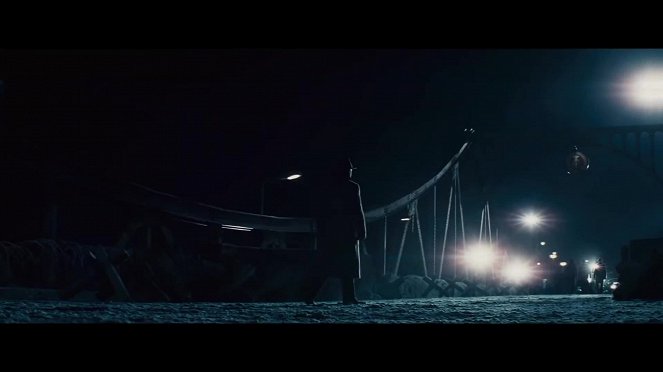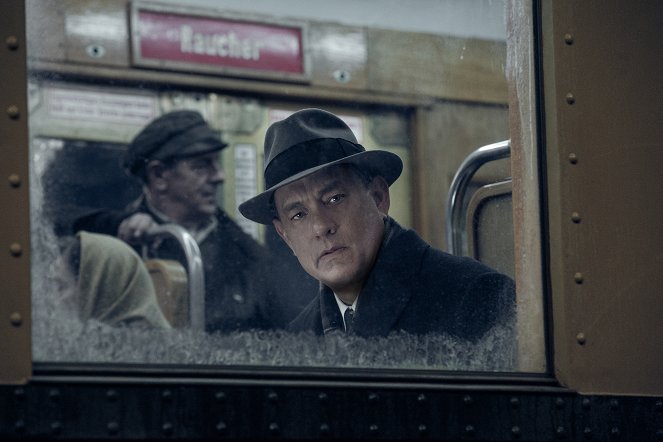Réalisation:
Steven SpielbergPhotographie:
Janusz KaminskiMusique:
Thomas NewmanActeurs·trices:
Mark Rylance, Domenick Lombardozzi, Victor Verhaeghe, Brian Hutchison, Tom Hanks, Joshua Harto, Henny Russell, Alan Alda, John Rue, Billy Magnussen (plus)VOD (3)
Résumés(1)
Ce thriller dramatique sur fond d'événements historiques raconte l'histoire de James Donovan (Tom Hanks), un avocat de Brooklyn qui se retrouve plongé au cœur de la guerre froide lorsque la CIA l'envoie accomplir une mission presque impossible : négocier la libération du pilote d'un avion d'espionnage américain U-2. Les scénaristes Matt Charman, Ethan Coen & Joel Coen ont intégré cet épisode remarquable de la vie de Donovan à une histoire inspirée de faits réels pour dresser le portrait saisissant d'un homme qui a accepté de prendre tous les risques. (20th Century Fox FR)
(plus)Vidéo (14)
Critiques (14)
La première partie est superbe, l’ambiance est prenante, Mark Rylance excelle par sa prestation… Mais ensuite, on passe au film américain typique, cliché, parfois ringard avec tout ce qu’on peut imaginer sous l’étiquette du film américain. Tant que la lourdeur de l’ambiance est contrecarrée par la légèreté de l’humour, ça ne me dérange pas, sauf que certaines blagues ou répliques me semblaient plutôt dévaloriser l’aspect artistique ou ne pas convenir. Associer un thriller d’espionnage se déroulant à Berlin-Est et de l’humour léger, c’est un oxymore et, dans ces circonstances-là, les gens n’en menaient pas large et n’avaient pas vraiment l’esprit à plaisanter. Tom Hanks est fidèle à lui-même et ça m’a fait plaisir de voir le petit rôle de Sebastian Koch – on dirait qu’il a été remarqué partout dans le monde avec sa participation à La Vie des autres.
()
Un peu embellie et pas assez captivante, mais malgré cela, un thriller d'espionnage fiable et divertissant avec une superbe esthétique rétro. Les mouvements de la caméra qui captent trois personnes assises à une table, filmés de la même manière qu'il y a 50 ans, m'ont déjà touché. Une excellente immersion atmosphérique dans l'époque, des dialogues élégamment écrits, Hanks, un beau rôle pour Mark Rylance. Spielberg devrait diriger la politique mondiale. Et seulement des personnes comme lui.
()
Bridge of Spies is a film about America, friendship despite the times and men who are just doing their jobs. Several decades ago, Hanks’s unassuming protagonist would probably have been played by Gary Cooper or James Stewart in a film directed by Frank Capra. As in Capra’s works, in Bridge of Spies American values are represented and defended by incorruptible individuals, not by unreliable institutions. At the same time, the quest for justice leads through so many obstacles and compromises that, at the end, instead of the joy of victory, there is a sense of relief that it’s over. (In addition to that, Spielberg again shows himself to be a master of suggestion and narrative shorthand in the climax, as he makes do with a very simple yet very telling shot of children climbing over a fence. In the context of the previously seen scaling of the Berlin Wall, unsettling cracks thus appear in the façade of the happy ending). ___ Donovan demonstrates his position outside of the system in both halves of the film by following his own rules of the game. He doesn’t act in the way that the people who have given hin his orders think he should act. His concept of justice is not subject to the anti-communist panic, and he makes fun of espionage work (“You know, spy stuff”), not giving it the degree of importance that you would expect from the protagonist of a spy thriller (interrupting a dialogue about the next course of action by telephoning his wife, with whom he sorts out what kind of jam he should bring her from the “fishing trip”). I see as the main screenwriting contribution of the Coen brothers, who, despite all their respect for classic Hollywood, never quite took it entirely seriously (just wait until the premiere of Ave, Caesar! for more compelling evidence) in their subversion of the exaggerated seriousness of a courtroom drama or spy movie by intentionally or seemingly leaving out genre-typical characters and employing down-to-earth catchphrases (“Can we just call them the Russians and save time?”), whose timing demonstrates the intuition of the master. ___ As is customary with Spielberg, the protagonist will have to defend his actions not only to the general public, but also (and, in the end, especially) to his family. Though absent from the latter part of the film, Donovan’s family is both an important motivation of Donovan’s actions (his repeatedly expressed wish to return to the warmth and comfort of his home, which he at least recalls with a hearty breakfast at the Hilton in Berlin) and the source of his doubts as to whether he is a good father to his son and a good husband to his wife. ___ The film’s opening scene, in which we see three different versions of Vogel (live, reflected in a mirror and in a finished self-portrait), aptly introduces us to the world of spies alternating between multiple identities while creating false expectations about the perceptibility of Vogel’s intentions. It soon becomes clear that he is not only a man who maintains an icy calm in all circumstances, but also one of the narrative’s most direct and honourable characters. He even wins over Hanks’s attorney with his sincerity. The special affinity between the two men, who need and influence each other, is expressed in the Berlin part of the film through Hanks’s cold, which forces him to constantly wipe his nose, just as we previously saw the phenomenal Mark Rylance do. ___ The creation of parallels between the individual characters and storylines is one of the film’s strengths, contributing along with the spiral structure of the narrative to its cohesiveness and subverting the black-and-white view of history. The second half of the film (which actually begins exactly halfway through the runtime) is basically a variation on the first half, thanks to which we realise that the two parties to the conflict have more in common than they are willing to admit. The individual shots often respond to each other and, thanks to their smooth continuity, we don’t fall out of rhythm and our attention doesn’t waver. ___ I find it almost needless to praise in Bridge of Spies the elements with which most of Spielberg’s films excel – economical and comprehensible storytelling through imagery and careful management of the viewer’s attention (largely without manipulating emotions – the film is unusually sparing in its use of music, using it for the first time after almost half an hour). Spielberg prepares us in advance with a musical motif, among other things, for the espionage plot, which does not fully take off until the second half of the narrative (the absence of exposition causes the storyline with the suddenly appearing economics student to seem clumsy) and alerts us to what we should pay attention to (“...whether they will embrace me or just put me in the back seat”). He expresses the dominance of one character or the other by their position in the shot, illustrates the thought process or the rebuttal of an argument with a counter-argument through appropriate camera movement, and completes the atmosphere with different colourways for the (warmer) West and the (almost colourless) East. Though 90% of Bridge of Spies consists of scenes in which two old men sit at a table and converse at length, it is every bit as gripping and suspenseful from start to finish as films based on ceaseless action (such as Mad Max). 85%
()
(moins)
(plus)
Lemonade Steven, or craft certainty. Yet even that can't deny the fact that Spielberg is stealing from himself, and as much as he wants to talk about strong ideas, he still comes out with kitsch that transgresses his "self-genre" boundaries. It's a great watch, and likely a few conservatives who will seem to step out of their conformist zone will give it a few awards, but the next day all I remember is the sheer coldness. What literally sticks out in some of the dialogue is the fact that the Coen brothers would have loved to have made it with a much greater degree of cynicism.
()
I must admit that I was a little sceptic about this movie. Personally, I don’t find the topic of espionage in the 1950s particularly suspenseful, but I was keeping in mind that Spielberg and Hanks were responsible for this and I shouldn’t have doubted them in the first place. I couldn’t have been happier after watching this and I must add that it’s one of the best movies that made it to Oscars this year. The story is absolutely natural and it’s really befitting the Cold War. Tom Hanks is a classic, but everybody is outshined by Mark Rylance whom I didn’t even known before, but now I know that I won’t forget about him. The only issue was the music, which was too American and it could do without all those emotions. The ending is a little too exaggerated, which doesn’t have to suit anyone. I was pissed, but it still didn’t make me take away a star; I’ve enjoyed this movie way too much for that over these two hours and a half.
()



Annonces